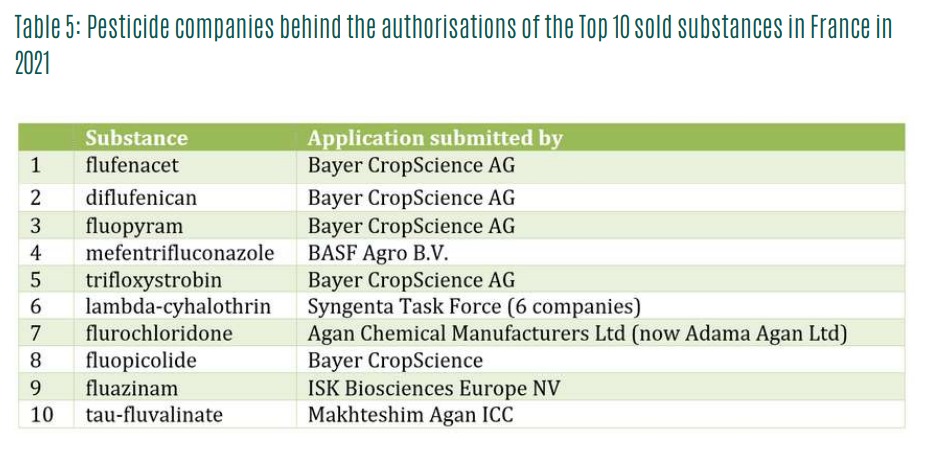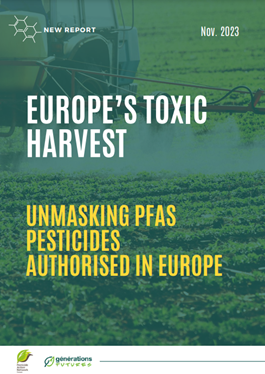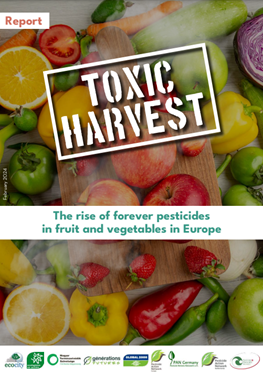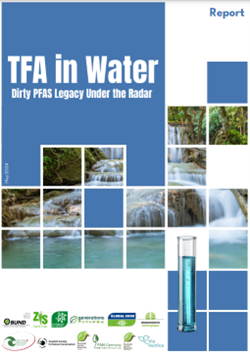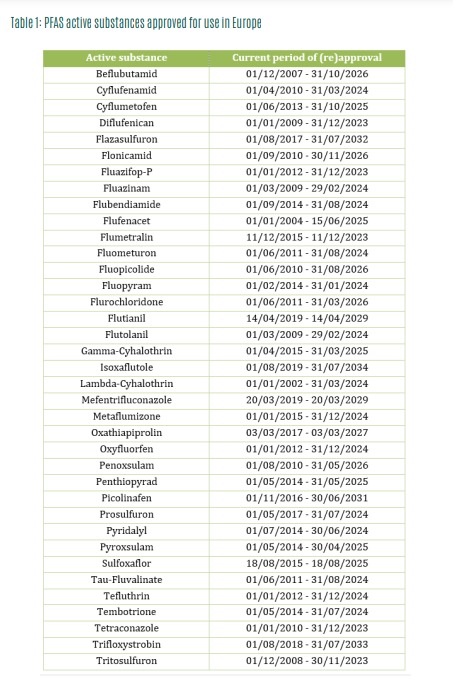
Do you think the world actually listened to the ‘Silent Spring’ warning by Rachel Carson in 1962? Yes; after many years of pollution, we replaced highly persistent and toxic organochlorines like DDT and Aldrin. However, we replaced them with other toxic chemicals. Organophosphates were found to be toxic to childrens’ brain development. Neonicotinoids are highly toxic to bees and wildlife and helped to create a new silent spring. And now we’re in the middle of the organofluorine age. By adding some fluorine atoms for stability, the industry produced this new class of forever chemicals. Including PFAS pesticides.
Persistent and very toxic PFAS pollute our soils, our waters and our bodies for generations to come. They do not only leach accidentally from factories or products. We deliberately spray them on our food and fields as PFAS pesticides. The level of PFAS pollution keeps increasing, endangering the right of future generations to live in a clean and healthy environment. This must end now. PAN Europe and its members demand an immediate ban on all PFAS pesticides.
"If the intent was to spread PFAS contamination across the globe there would be few more effective methods than lacing pesticides with PFAS," Kyla Bennett, Science Policy Director PEER, USA
There are thousands of PFAS, and very few have been thoroughly studied. Evidence shows that PFAS can attack our immune system. They disturb our hormone system and can cause developmental effects in babies and children. They attack the liver. They can accumulate in our bodies. And they hardly break down.
PFAS pesticides
One in 8 active pesticide ingredients currently authorised in the EU are PFAS. These 31 active substances are deliberately sprayed across EU agricultural fields. Their use is on the rise. All contain a few strong carbon-fluoride bonds, which are enough to enhance their persistence in the environment. If they degrade, most of them end up as the small PFAS trifluoroacetic acid (TFA) and its salt trifluoroacetate in our water.
Here are all PFAS pesticides currently authorised for use in the EU (July 2025)
PFAS pesticides in fruits and vegetables
Fruit and vegetables in Europe are increasingly contaminated with PFAS pesticide residues. We analysed official data from the national monitoring programmes in Member States.
Between 2011 and 2021 the number of fruit and vegetables with detected PFAS pesticide residues has tripled. We see an increase of 220% for fruit and 274% for vegetables. In some of the EU Member States, the growth rate has been even more dramatic.
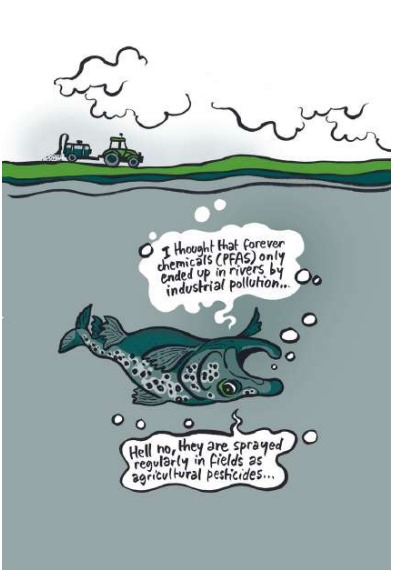 TFA in surface and groundwater
TFA in surface and groundwater
The highly persistent chemical trifluoroacetic acid (TFA) is a degradation product of PFAS pesticides. It is found in water all over Europe, especially in agricultural areas. PFAS pesticides are the main cause of water contamination with TFA in rural areas, followed by refrigerants, sewage treatment, and industrial pollution. The TFA levels found in surface and groundwater represent the largest known area-wide water contamination by a man-made chemical. The extent of the contamination is alarming and calls for decisive action.
TFA in drinking water
TFA is very soluble, mobile and persistent. The TFA levels appear to be within what are currently considered safety limits. However, we recently found out that TFA can be toxic to reproduction and has the same mechanism of damaging our health as other PFAS. The input continues to increase every day due to the use of PFAS pesticides and coolants ("F-gases"). The “safety buffer” for our health is small if not already passed.
To ensure that European citizens can still drink tap water safely in ten or fifty years' time, the governments that have enabled this pollution must now take swift and decisive action.
Our reports on PFAS and the breakdown product TFA in water
In this first report, we and Générations Futures reveal the presence of eternal pollutants (PFAS) among pesticide active substances. These hazardous substances are exempted from the forthcoming European PFAS restriction, while their use in agriculture is rising. Immediate action is needed to get them banned.
While PFAS contamination is often attributed to ‘accidental’ industrial emissions or negligent pollution, our report uncovers an intentional and widespread source of PFAS pollution: the PFAS pesticides.
In this second report, we show how fruit and vegetables in Europe are increasingly contaminated with PFAS pesticide residues. We analysed official data from the national monitoring programmes of pesticide residues in food in EU Member States. The number of European fruit and vegetables with detected PFAS pesticide residues has nearly tripled between 2011 and 2021, with a growth rate of 220% for fruit and of 274% for vegetables. In some of the EU Member States studied individually, the growth rate has been even more dramatic: Austria (+698% for fruit, +3277% for vegetables) and Greece (+696% in fruit, +1974% in vegetables).
The third report 'TFA in water, dirty PFAS legacy under the radar' was a joint research with Global 2000 and other members in 10 EU countries. The exploratory survey of rivers, lakes, and groundwater shows alarming levels of contamination by the forever chemical TFA (trifluoroacetic acid or trifluoracetate). PFAS pesticides are considered the main cause of water contamination with TFA in rural areas, followed by refrigerants, sewage treatment, and industrial pollution. We analysed 23 surface water and six groundwater samples from ten EU countries for TFA and other PFAS. The extent of the contamination is alarming and calls for decisive action.
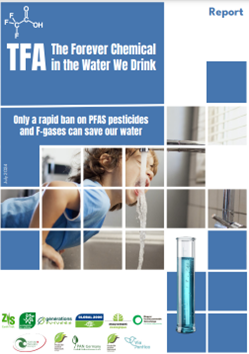 In the fourth report, we have analysed drinking water (both tap water and bottled water) for the presence of TFA. TFA was detected in 34 of 36 European tap water samples (94 %) from eleven EU countries and in 12 of 19 bottled mineral and spring waters (63 %). The values in tap water ranged from "undetectable" to 4,100 ng/L, with an average of 740 ng/L. TFA values in mineral and spring waters ranged from "undetectable" to 3,200 ng/L, with an average of 278 ng/L. Analysis confirms that, beyond contamination hotspots, TFA is the dominant (> 98 %) PFAS contamination in the water.
In the fourth report, we have analysed drinking water (both tap water and bottled water) for the presence of TFA. TFA was detected in 34 of 36 European tap water samples (94 %) from eleven EU countries and in 12 of 19 bottled mineral and spring waters (63 %). The values in tap water ranged from "undetectable" to 4,100 ng/L, with an average of 740 ng/L. TFA values in mineral and spring waters ranged from "undetectable" to 3,200 ng/L, with an average of 278 ng/L. Analysis confirms that, beyond contamination hotspots, TFA is the dominant (> 98 %) PFAS contamination in the water.
Industry trying to downplay TFA toxicity, authorities did hardly react for 27 years
Our latest report reveals that authorities were already warned that TFA can be toxic to humans in 1998. No reaction followed. The chemical industry presented many narratives that TFA is not a problem: it is water soluble so it easily leaves the body, it does not accumulate, it could be of natural origin and it is not harmful. Now, 27 years after the first warning signs, we know that TFA can be toxic to reproduction and it can be found everywhere in Europe in ground- and drinking water and even in some mineral waters. It accumulates in wine, cereals and even blood.Action should have been taken long ago, but we can not wait any longer: ban all PFAS pesticides now!
Updates and links
Press release and report: New Report Exposes industry tactics to downplay toxic ‘forever chemical’ TFA
Position Paper: Banning PFAS pesticides and other sources of TFA (July 2025)
Press Release: ECHA publishes proposal to classify TFA as reprotoxic - PAN Europe asks for urgent ban of all PFAS pesticides (May 2025)
Blog: EU SCoPAFF meeting: the end of PFAS pesticides? March 2025
Press Release: EU Member States agree to ban Flufenacet - call to ban all PFAS pesticides March 2025
Letter: Urgent call to ban the PFAS pesticide fluopyram due to its TFA emissions Jan 2025
Briefing: TFA: The ‘Forever Chemical’ in European Mineral Waters December 2024
Blog: TFA is polluting our water – We have crossed a Planetary boundary November 2024
Press Release: High concentrations of TFA in drinking water November 2024
Report: TFA: The Forever Chemical in the Water We Drink July 2024
Report: TFA in Water: Dirty PFAS Legacy Under the Radar May 2024
Briefing: Toxic Harvest: The rise of forever pesticides in fruit and vegetables in Europe Feb 2024
Report: Toxic Harvest: The rise of forever pesticides in fruit and vegetables in Europe Feb 2024
Report: Europe Toxic Harvest: Unmasking PFAS pesticides authorised in Europe Nov 2023
